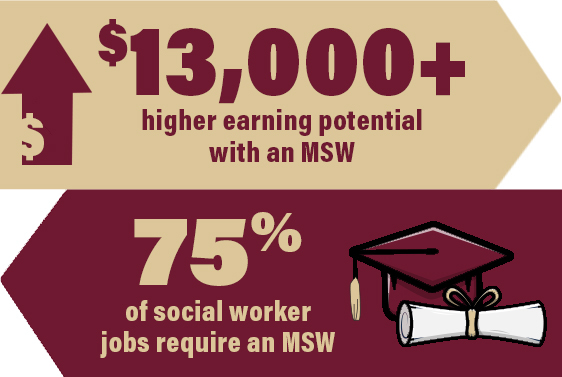Florida State University

This course focuses on reciprocal relationships between human behavior and social environments. Content includes empirically based theories and knowledge that focus on the interactions between and among systems of all sizes, including individuals, groups, societies, and economic systems. Theories and knowledge of biological, psychological, sociological, cultural, and spiritual development across the lifespan are critiqued, especially as they relate to at-risk populations. In addition, theories and knowledge about the range of social systems (individual, family, group, organizational, and community) in which people live are examined, including the ways social systems promote or deter people in maintaining or achieving health and well-being.
Prepare for the future of social work in Virginia—and across the country—with Florida State University. Don’t let your location limit your education. Our online Master in Social Work (MSW) program is regularly listed as one of the best in the nation. Part-time coursework allows you to continue working full-time as you build your knowledge, practical skills and national network.
This course provides students with knowledge and skills related to the theory, research, and implications of child and adolescent maltreatment for child development and psychopathology. Course content is presented within the context of child welfare practice and social work with children and adolescents in public agencies and programs. Particular attention will be given to common psychological disorders that result from maltreatment and accompanying treatment issues. Issues related to individuals, families, groups, and communities are covered and attention is given to working with ethnic minorities, women, gays and lesbians, and persons with disabilities.
There are two options for earning your MSW online:
Advance Standing Program: For those with a Bachelor's of Social Work. Complete in 2 years with 1 in-field placement.
Traditional Program: For those with a Bachelor's in another area of study. Complete in 3 years with 2 in-field placements.
This advanced practice course emphasizes development of clinical skills. Students will refine their clinical skills, building on the research-based, nonspecific (common factors) components of therapeutic work (i.e., therapeutic alliance, empathy, goal consensus/collaboration, positive regard/affirmation, and genuineness) and specific factors (validated treatments). The course provides in-depth coverage of three empirically based models; Solution Focused, Motivational Interviewing, and Interpersonal Therapy. Learning applications of techniques informed by these models provides opportunities to enhance professional use of self. The course examines similarities and differences among models and allows students to discern appropriate use of techniques, client populations, settings, and problem interactions. Students will develop competency in the ethical and strength-based use of these models.
By 2030, the U.S. Bureau of Labor Statistics projects social work job growth will increase nationally by 12%.1 This translates to approximately 89,200 new job openings for social workers to make a difference. It’s estimated that nearly 75% of social worker positions require an MSW or higher qualification.2 Earning an MSW could elevate your impact, employability and earning potential by over $13,000 more than those with a BSW alone—based on various factors such as industry, title and location.3

Those wishing to become a Licensed Clinical Social Worker (LCSW) in Virginia must meet the following requirements:
Requirements for licensure may change so be sure to frequently check Virginia state requirements to ensure you are on the correct path to licensure.
Our clinically-focused curriculum qualifies you to pursue a license in clinical social work in Virginia. This is a sample list of courses you will take while enrolled in our MSW programs. For the complete Traditional and Advanced MSW program course list, please download your guide.
Our devoted faculty and commitment to research help put us in the top 12% of social work graduate schools ranked by U.S. News & World Report.
Join the vibrant FSU community consistently recognized by INSIGHT Into Diversity for its commitment to diversity and inclusion.
As one of the first online MSW accredited by the Council on Social Work Education, we rigorously adhere to CSWE accreditation standards.
For more than 100 years, FSU has offered classes on social welfare—establishing us as a center of social work practice and policy.
We are renowned for our research contributions and quality of education. U.S. News & World Report ranks us in the top 12% of social work graduate schools.
Yes, all coursework is completed online except for field placements that develop practical competence and confidence through hands-on experience.
The difference between our programs is dependent on your undergraduate experience.
The Advanced Standing MSW is available to students who have completed a bachelor’s degree in social work from a Council on Social Work Education (CSWE) accredited institution.
The Traditional MSW is for students who hold a bachelor’s degree in any concentration other than social work.
The Traditional MSW program is 61 credit hours, the Advanced Standing MSW is 39 credit hours. Tuition varies based on your location:
Costs are subject to change. Additional course fees may apply.
An online Master of Social Work equips you to achieve and lead greater outcomes in schools, communities, government, healthcare, and public and private organizations. Possible roles could include:
All field placements are completed in person, generally during regular business hours. Traditional MSW students complete two field placements, Advanced Standing MSW students must complete one field placement.
For this online program, there is currently only a part-time option. You can take a maximum of two courses at a time.
No, the College of Social Work does not require a GRE at this time.
Click the button below and fill out the form to access your program guide. An online recruitment advisor will connect with you soon to answer questions and share more about how Florida State can help you make a difference.
https://www.socialworkers.org/LinkClick.aspx?fileticket=1_j2EXVNspY%3D&portalid=0
https://www.socialworkers.org/Careers/Career-Center/Kickstart-Your-Job-Hunt/Social-Work-Salaries
https://www.lva.virginia.gov/public/dvb/bio.php?b=Stokes_Ora_Brown
https://www.socialworkers.org/LinkClick.aspx?fileticket=wCttjrHq0gE%3D&portalid=0